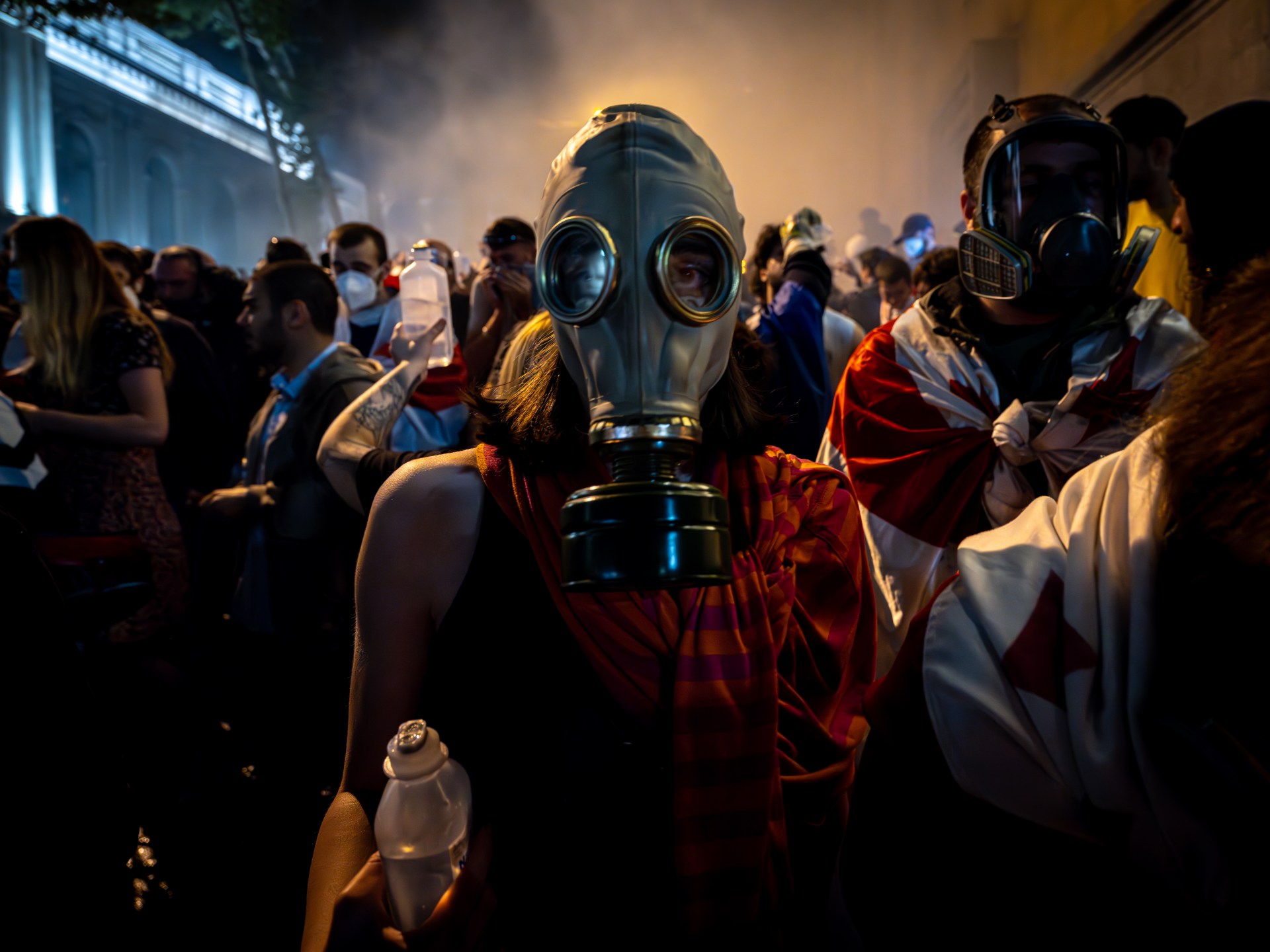Columbia University has told students protesting against Israel’s war on Gaza to clear their campus encampments by 8am (12:00 GMT) on Wednesday, with no agreement reached between the Ivy League institution and the organisers.
As Columbia students marked the seventh day of their Gaza Solidarity Encampment on Tuesday despite a wave of arrests and suspensions of protesters, they initially faced a deadline from university President Nemat “Minouche” Shafik until midnight to reach negotiations to dismantle the encampments. Shafik made clear that if the discussions were unsuccessful then “we will have to consider alternative options for clearing” the area.
But that deadline passed without news of an agreement until word of an extension of several hours circulated on campus. So, the standoff continues.
Pro-Palestine protests have roiled university campuses in the United States from coast to coast. But Columbia has been the heart of the solidarity movement as the Gaza death toll spirals to more than 34,000 people – mainly children and women – killed since the conflict erupted on October 7.
What’s the latest from the Columbia protest?
The situation on campus calmed down after the deadline was extended. Students who had taken down tents, put them back up and largely returned to the encampment, Caroline Anne Bissonnette, a journalism student who has been covering the protests since the first day, told Al Jazeera.
The protesters are demanding that the institution divest from corporations that profit from Israel’s war on Gaza, which has crossed the 200-day mark. Additional demands include more financial transparency about Columbia’s investments, and the severing of academic ties and collaborations with Israeli universities and programmes. The demonstrators are additionally demanding a complete ceasefire in Gaza.
At about 1:35am (05:35 GMT) on Wednesday, Columbia University’s student radio station WKCR reported, citing sources on and off campus, that 50 police officers officers from the force’s Strategic Response Group (SRG) were lined up outside the campus building at 116th Street in New York City.
A student reporter told WKCR that the police response was “more severe than we have seen before”, and that the SRG officers were wearing face masks and helmets and had zip ties as they faced protesters on the pavements. The radio station clarified that there was no indication that police were mobilising inside the campus.
Police had earlier warned the protesters outside campus that if they used amplified sound then they would be arrested, WKCR reported, adding that the protests continued with booming sounds including drums, horns and full-throated chants.
The students’ chants “echoed with the protesters outside the campus”, Columbia journalism student Tiffany Le told Al Jazeera.
On Monday, the university announced that classes would be held in hybrid mode until the end of the spring semester.
Columbia is now facing an “academic boycott” after more than 1,400 academics around the world signed a letter saying they will not participate in academic and cultural events at the university and its affiliate Barnard College until suspensions of student protesters in recent days are reversed, police are removed from the campus and Shafik resigns.
What are the Columbia protesters saying?
The movement is organised by the Columbia University Apartheid Divest (CUAD) coalition of student organisations, Students for Justice in Palestine and Jewish Voice for Peace.
In a statement posted on X, CUAD announced on Wednesday that its team had left the negotiations with the university and would not engage further “until there is a written commitment that the administration will not be unleashing the NYPD [New York Police Department] or the National Guard on its students”.
It reiterated that civilians, including large numbers of women and children, have been killed in Gaza and every university in the besieged enclave has been destroyed.
“We refuse to concede to cowardly threats and blatant intimidation by university administration. We will continue to peacefully protest,” it said.
PRESS RELEASE:
Columbia University Threatens Students with the National Guard After Refusing to Bargain in Good Faith.
We refuse to concede to cowardly threats and blatant intimidation by university administration. We will continue to peacefully protest. #cu4palestine pic.twitter.com/IqAlXwyeHN
— Columbia Students for Justice in Palestine (@ColumbiaSJP) April 24, 2024
What could Columbia do?
In an email to the student body, Shafik wrote that if the negotiations between Columbia’s administration and the student organisers did not end in “dismantling the encampment, dispersing, and following university policies”, then the university would consider “alternative options” to clear the encampment.
“I also want to be clear that we will not tolerate intimidating, harassing, or discriminatory behaviour,” she warned, adding that “the right to protest is essential and protected at Columbia, but harassment and discrimination is antithetical to our values and an affront to our commitment to be a community of mutual respect and kindness”.
CUAD said in a statement at 12:30am (04:30 GMT) that the university had “threatened” negotiators to call in both the National Guard and police “if we do not acquiesce to their demands”.
On April 18, more than 100 pro-Palestinian protesters were arrested from Columbia on charges of trespassing. Several students were also suspended from Columbia and Barnard, including Isra Hirsi, the daughter of Ilhan Omar, a Democrat in the US House of Representatives.
Why are congressional leaders visiting?
Republican House Speaker Mike Johnson announced that he will visit Columbia on Wednesday to meet Jewish students. In a post on X, he wrote that Jewish students do not feel safe on campus. “Let’s be clear: these are not peaceful protests, these are antisemitic mobs,” he wrote.
Amid anti-Israel protests, Jewish students at Columbia University don't feel safe.
It’s become so dangerous that students were forced out of the classroom.
Let’s be clear: these are not peaceful protests, these are antisemitic mobs. pic.twitter.com/mHwOOireTJ
— Speaker Mike Johnson (@SpeakerJohnson) April 23, 2024
Delegations of Republican and Democratic members of Congress also visited the university’s locked-down campus on Monday to express concern for the security of Jewish students on campus.












 English (US) ·
English (US) ·  Turkish (TR) ·
Turkish (TR) ·